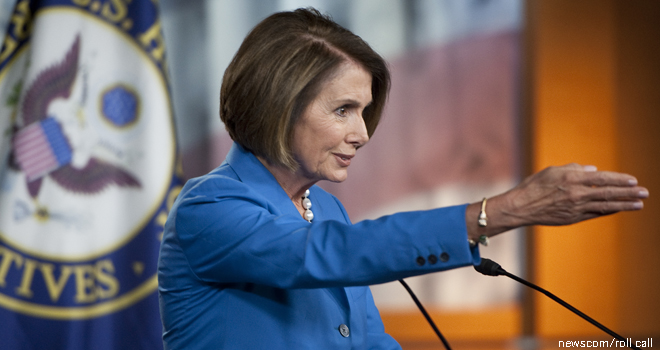House Minority Leader Nancy Pelosi acknowledged Friday that Democrats may reluctantly accept a last-minute compromise to avoid a default that involves up to $2.5 trillion in spending cuts — without agreed-upon new tax revenues — if Medicare, Medicaid, and Social Security are protected from the debt limit brinksmanship.
[TPM SLIDESHOW: Debt Ceiling Negotiations At The White House]
The plan would place a firewall between entitlement spending and the threat of default, upsetting GOP plans to force deep, immediate cuts to those programs. And if, as a result, the GOP declined the offer, Democrats would agree to punt the questions of entitlement spending and tax revenues to a future, streamlined legislative process.
The potential endgame, Pelosi said, would meet an arbitrary GOP requirement that Congress must only grant President Obama as much new borrowing authority as he’s willing to accept in spending cuts, and leave for a later date a twinned fight over revenues and social insurance programs.
“We’re willing to bite the bullet and make serious cuts in discretionary spending,” Pelosi told a small group of reporters and bloggers. “That could go to a trillion dollars or more. And the interest saved on that can take us to like a trillion and a half dollars saved.”
We could go even further with non-health mandatories, could take us almost to two trillion. We could use the offshore — the Overseas Contingency [the wars in Iraq and Afghanistan] — could take us to two-and-a-half trillion dollars. Which is the dollar-for-dollar for the lifting the debt ceiling. I don’t think we have to have dollar-for-dollar, but for those who think they do, there’s a path to get there.
That’s not a great deal for Democrats, she noted, but it protects key programs like Social Security, Medicare, and Medicaid. “[T]hat’s a non-revenue path. I don’t like it at all but it doesn’t go near our entitlements,” Pelosi said.
There’s one big problem: “I don’t think the Republicans are going to accept that. So whatever they would want to accept over-and-above that would have to be something, I think, down the road. And that would be treating entitlements and revenue.”
This framework is compatible with a plan Senate Majority Leader Harry Reid (D-NV) and Senate Minority Leader Mitch McConnell (R-KY) have written, and will deploy if President Obama and House Speaker John Boehner (R-OH) can’t reach a consensus on an even farther-reaching package. But they have precious little time. “The moment of truth is now, Harry Reid says he needs eight days to take anything to the floor,” she said.
Pelosi reiterated her insistence that Democrats will oppose cuts to entitlement benefits as a tool of deficit reduction. And she established a rule of thumb for how much help Boehner can expect from her party.
“As far as the number is concerned, the bigger the cuts the fewer the Democrats,” she said.
But this again leaves open the question of what individual Democrats count as a benefit cut, and how well they’d take to the idea of a plan that didn’t include agreed upon revenue increases, or guaranteed revenues in the future.
In an interview with TPM, Rep. Barney Frank (D-MA) — the top Dem on the House Financial Services Committee — dismissed outright, and in Frank-esque terms, the idea of reducing seniors’ cost of living adjustments, or increasing the Medicare eligibility age. “That’s people who’ve been sitting on their asses their whole lives telling some woman who’s been standing on her feet as a store clerk that 67’s too early for her — she should do it till she’s 70.”
But he distinguished those sorts of benefit cuts from means-testing of both Social Security and Medicare, which he said would be appropriate steps to take to improve America’s fiscal situation.
“A means test done in an efficient way isn’t a problem,” he said. “I understand that. Like in Social Security. We already have a partial means test. I get Social Security. My Social Security income is taxed as it should be. I would increase the tax rate on my Social Security income. You don’t want to means test it up front — that becomes awkward — but say you’re making more than $100,000? Tax my Social Security at 95 percent. That’s fine. There’s an easy way to do that.”
On Medicare, “I would be for increasing copays for people above a certain income,” Frank said. “I think high copays for people making more than $100,000 is perfectly reasonable.”
To do any entitlement cuts along these lines, though, Democrats would need more than just a promise that revenues will be increased in the future. If Boehner asks to punt on that question, “The answer is we’d never accept it,” Rep. Rob Andrews (D-NJ) — ranking member of the Education & Labor health oversight committee — told reporters Friday. “A promise alone will not get it done. He’d promise to bring up a bill that would raise net revenue of a trillion of dollars to be fair to everyone, and I’d promise to play center field for the Yankees. My intention is there but my ability isn’t…. No way that is going to happen. There are no ‘super-duper’ promises there are only enforceable mechanisms and non-enforceable mechanisms. Without an enforceable mechanism there aren’t going to be any Democratic votes in the process.
Republicans have to figure out a way to adopt an enforceable mechanism to increase revenues, because if they don’t, Andrews noted, Dems have a wild card. “If nothing happens, there’s a tax increase on the wealthy group January 1 of 2013.”
Additional reporting by Igor Bobic.






